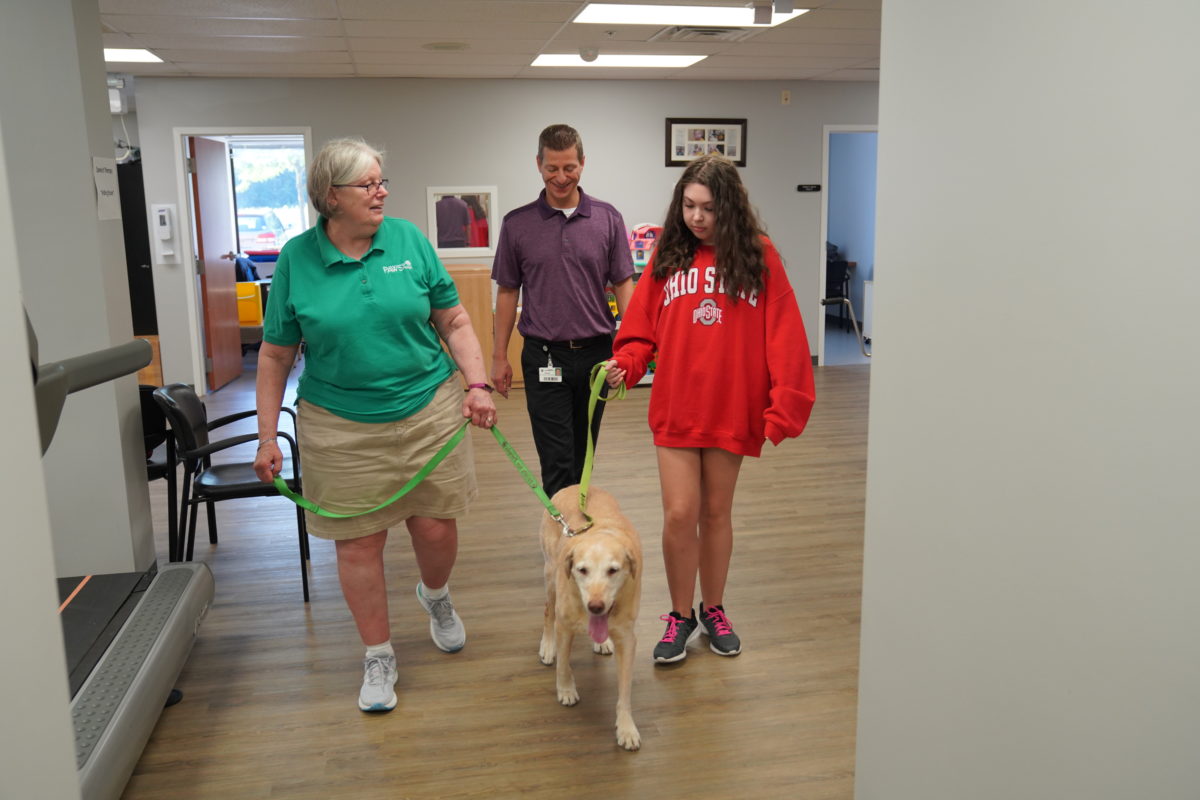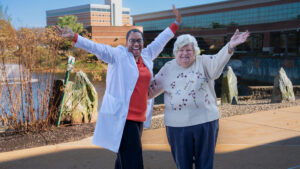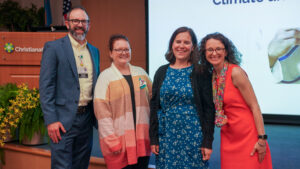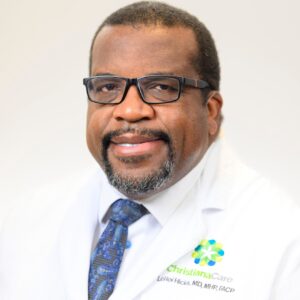At 67, Nancy Brock was actively enjoying her retirement, training dogs and gardening with her husband Jim at their home in North Wilmington. One day in May 2017 she was playing with her two dogs in their yard.
“My husband thought I was moving strangely and asked if I was OK,” she said. “He turned away for a few seconds and when he turned back, I was on the ground.”
He sprang into action, dialing 911. Rapidly Brock was en route by ambulance to the Comprehensive Stroke Center at Christiana Hospital to receive the highest level of specialized stroke care. Her husband’s fast response was key to her positive outcome and her ability to resume doing the things she loves after a potentially devastating brain attack.
The stroke team was waiting as she reached the Emergency Department. A CT scan soon revealed Brock was suffering an ischemic stroke — a clot interrupting blood flow through the right carotid and right cerebral arteries. She received tPA — a powerful clot-busting medication, which would not have been an option if she arrived beyond the critical four-and-a-half-hour window of time after the stroke started.
To remove the remainder of the clot, neurointerventional surgeon Gregg H. Zoarski, M.D., performed a thrombectomy, threading a catheter through an artery in the groin up to the blocked vessel at the base of Brock’s brain. He then deployed a stent retriever and tiny suction catheter to draw out the clot, “like pulling a cork from a bottle,” he said.
Dr. Zoarski and his colleagues are highly experienced in advanced techniques for treating strokes like Brock’s, as well as brain aneurysms, vascular malformations, and narrowing of the blood vessels in the neck or head.
Christiana Care is one of nation’s highest-volume stroke centers, treating more than 2,000 strokes a year. Christiana Care’s neurointerventional surgeons perform 130 to 140 thrombectomies a year and treat an equal number of brain aneurysms using minimally invasive techniques rather than open surgery.
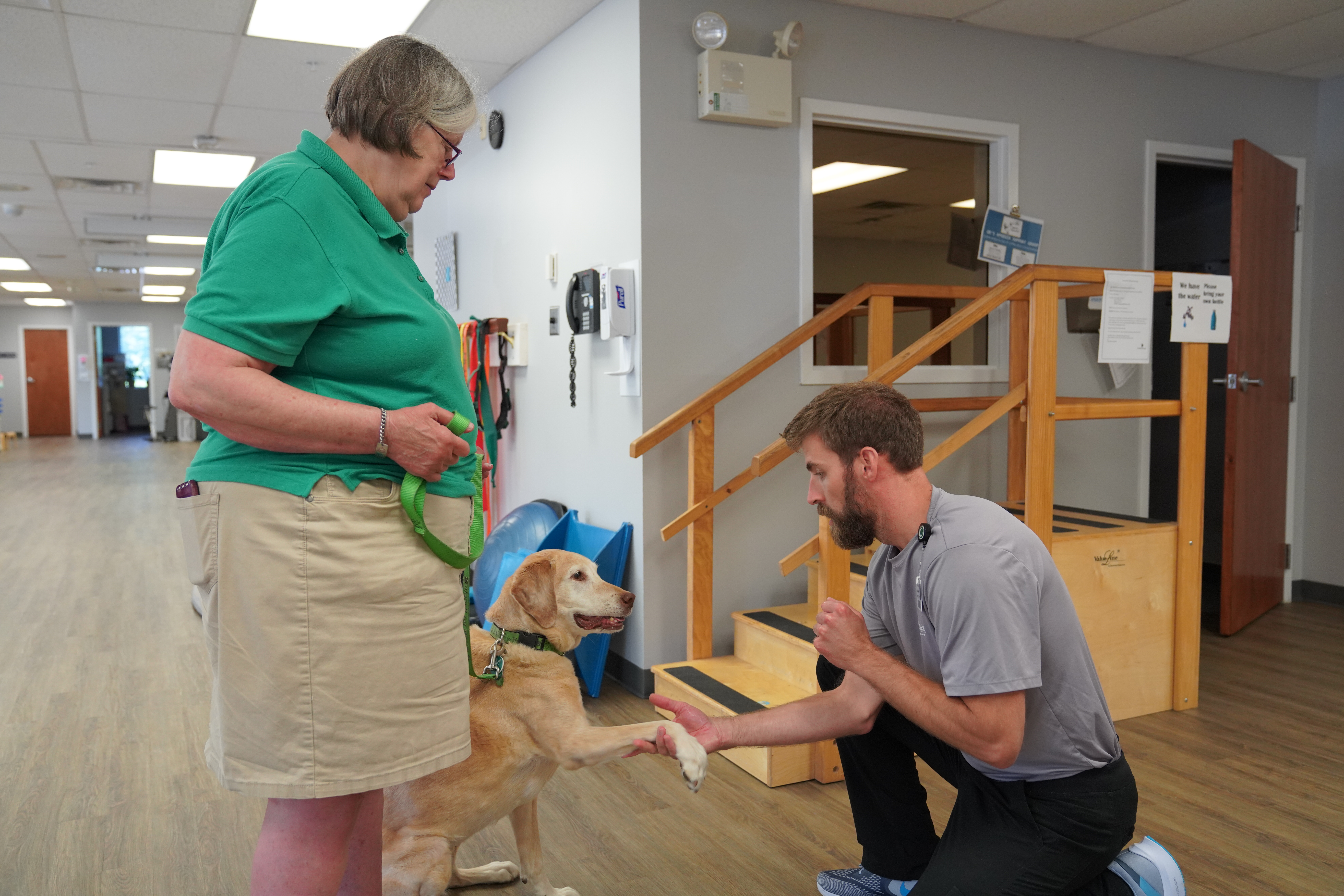
Brock’s rehabilitation began almost immediately after her surgery. It was difficult for her to maneuver because she broke her wrist in her fall, which required a cast from her shoulder to her fingertips.
“My first goal was to get out of bed, go to a real bathroom and use a real toilet,” she recalled. “It doesn’t sound like much of a success but it was.”
She started walking with a cane, looping around the nurse’s station several times a day. “They taught me how to go up and down steps with my cane.”
Because doctors weren’t precisely certain what caused Brock’s stroke, she went home with a 21-day heart monitoring unit. The test revealed that she suffers from atrial fibrillation, commonly known as AFib, a quivering or irregular heartbeat that can lead to blood clots, stroke, heart failure and other complications.
“Christiana Care is an early adopter of cardiac monitoring in cases where the cause of stroke is not known,” said Waimei Tai, M.D., a vascular neurologist. “Without it, cases like this would be difficult to diagnose.”
Brock’s recovery continued, a team effort in which she and her family partnered with Christiana Care therapists. Several times a week, a physical therapist came to her house, working with her on exercises to strengthen her left side and enhance her ability to walk.
A visiting occupational therapist helped her to regain mobility in her hands. They encouraged her to establish personal goals, such as taking walks and resuming dog training.
“My therapists were wonderful,” she said. “They supported me emotionally, as well as physically.”
At first, Brock relied on her husband to dress her. Soon, she was pulling on jeans and T-shirts, requiring her husband’s help only to put on socks.
In July, eight weeks after her stroke, she was back behind the wheel of her car. She resumed grocery shopping, using her cart for support instead of a cane.
In September, she returned to teaching dog obedience at Wilmington Kennel Club.
By October, she was giving tours and selling pumpkins at Ramsey’s Farm in North Wilmington. She resumed her work with PAWS for People, which trains volunteers to take dogs and cats to visit people who are ill, disabled or elderly. She took her Labrador Retriever Honey to Albert Einstein Academy, where Brock taught kindergarten and second grade before her retirement.
“I go every Monday morning, and the children read to my dog,” she said.
The Brocks also began attending a stroke support group that meets at Christiana Hospital. Each Thursday morning, she takes Honey to Christiana Care Rehabilitation Services at Glasgow to meet patients with neurological injuries.
“It is my way of giving back to the therapists who helped me to reclaim my independence after my stroke,” she said.
Brock still has mild deficits, such as an occasional memory lapse and mild weakness on her left side.
“But if you met me on the street you would never know it,” she said.
She has yet to achieve her final goal, learning how to ride a bike again.
Jim Brock took his wife on a drive to their house near Bethany Beach, Delaware, with an idea in mind as to how he could help her achieve her wish. He bought her a modified bike at a local shop, low to the ground with adult training wheels.
Nancy Brock is rolling again. And she isn’t done yet.
“Eventually, I will take the training wheels off,” she said.
